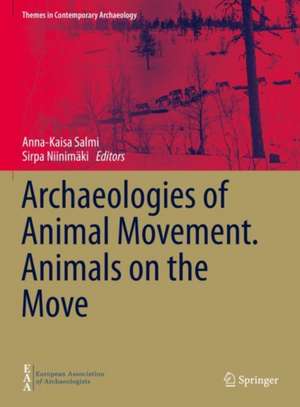Archaeologies of Animal Movement. Animals on the Move: Themes in Contemporary Archaeology
Editat de Anna-Kaisa Salmi, Sirpa Niinimäkien Limba Engleză Hardback – 29 iun 2021
Preț: 590.40 lei
Preț vechi: 776.85 lei
-24% Nou
Puncte Express: 886
Preț estimativ în valută:
112.97€ • 118.27$ • 93.48£
112.97€ • 118.27$ • 93.48£
Carte tipărită la comandă
Livrare economică 02-08 aprilie
Preluare comenzi: 021 569.72.76
Specificații
ISBN-13: 9783030687434
ISBN-10: 3030687430
Pagini: 106
Ilustrații: VII, 106 p. 41 illus., 19 illus. in color.
Dimensiuni: 210 x 279 mm
Greutate: 0.54 kg
Ediția:1st ed. 2021
Editura: Springer International Publishing
Colecția Springer
Seria Themes in Contemporary Archaeology
Locul publicării:Cham, Switzerland
ISBN-10: 3030687430
Pagini: 106
Ilustrații: VII, 106 p. 41 illus., 19 illus. in color.
Dimensiuni: 210 x 279 mm
Greutate: 0.54 kg
Ediția:1st ed. 2021
Editura: Springer International Publishing
Colecția Springer
Seria Themes in Contemporary Archaeology
Locul publicării:Cham, Switzerland
Cuprins
Chapter 1. Reindeer on the move: An introduction to the archaeology of animal movement.- Chapter 2. Scaling with size in horses may have implications for reconstructing activity from entheseal changes.- Chapter 3. Preliminary reflections on horse – Human-horse relationships among the Slavs of the Early Medieval Poland read from history and archaeozoology.- Chapter 4. Pathological peculiarities between modern ecotypes of Fennoscandian reindeer: Injury patterns and implications for domestication and paleoecology studies.- Chapter 5. Reindeer physical activity patterns and reconstruction of feeding behavior: Implications for reindeer domestication and human-reindeer interaction.- Chapter 6. Feeding patterns and management of dogs and chickens from ancient to medieval sites of Ukraine: a stable isotope analysis.- Chapter 7. Complex cattle exchange in the Scandinavian Funnel Beaker Culture. The case of Falbygden, Sweden.- Chapter 8. Animals, households, and communities in Bronze and IronAge Central Eurasia.- Chapter 9. Spread of foreign cattle in Lithuania in the Late Medieval and Early Modern Periods.- Index.
Notă biografică
Anna-Kaisa Salmi is an Academy Research Fellow and Associate professor in Archaeology at the University of Oulu. Her research interests include northern human-animal relationships, the roles of animals in ritual and religion, and working animals. She currently leads ERC and Academy of Finland funded project on reindeer domestication.
Sirpa Niinimäki is a postdoctoral researcher in Archaeology at the University of Oulu. She is working on methodological aspect of skeletal activity markers as well as their utilization on archaeological material. Her study species include both human and reindeer skeleton.
Sirpa Niinimäki is a postdoctoral researcher in Archaeology at the University of Oulu. She is working on methodological aspect of skeletal activity markers as well as their utilization on archaeological material. Her study species include both human and reindeer skeleton.
Textul de pe ultima copertă
This book presents the state-of-the art in the analysis of animal movements in the past and its implications for human societies. It also addresses the importance of animal activity and mobility for understanding past human societies and past human-animal relationships through cases studies from different periods and areas. It is the first book to focus on the archaeology of animal movement on different scales – from fine-tuned muscle movements of working animals to feeding behavior and to long-distance movements across landscapes and regions.
With the recent development of fine-tuned methodologies such as stable isotope analysis and physical activity assessment, the potential to understand how animals moved about in the past has increased substantially. While the chapters in the volume utilize a wide range of archaeological methods, they are all united by an emphasis on understanding animal activity and mobility patterns as something that has a major impact on human societies and human-animal relationships. Chapters in this volume show that animal activity patterns provide information on multiple aspects of human-animal relationships, including analysis of animal management practices, transhumance, global and regional trade networks, and animal domestication. This volume is of interest to scholars working in zooarchaeology and early human societies.
Caracteristici
First book to address the archaeology of animal movement Addresses the effect of animal movement on human societies Presents the state-of-the art in the analysis of past animal movement and mobility














